'Feral noise': Why Gang of Four's Entertainment! was the most blistering debut album of all time
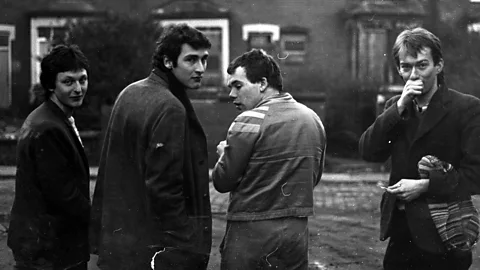 Andrew Corrigan
Andrew CorriganThe British post-punk band's 1979 LP was a revolutionary mix of abrasive guitar and subversive societal observations. As well as inspiring everyone from Kurt Cobain to Frank Ocean, 45 years on, it still speaks powerfully to today's youth.
"How can I sit and eat my tea… with all that blood flowing from the television!?" So chants Jon King from post-punk innovators Gang of Four, kicking off their song 5.45 in powerful style. As he continues with more despairing slogans – "Watch new blood on the 18-inch screen" and "Guerrilla war struggle is a new entertainment" – a whirring, bluesy melodica and lead guitarist Andy Gill's focused stabs of a Fender Stratocaster abrasively bunch around the frank vocals like an angry mob clutching pitchforks.
The song is among the numerous highlights of Gang of Four's landmark 1979 debut, Entertainment!, which was released 45 years ago last week. The refrains of 5:45 could easily refer to our conflict-heavy, media-saturated world today, just as other lyrics on the album feel positively prescient – take Natural's Not In It and its mockery of a collective "coercion of the senses", which could equally be an allusion to our society's obsession with TikTok and Instagram.
Even the artwork of Entertainment! – which shows a cowboy and a Native American framed by the sarcastic words, "The Indian smiles, he thinks the cowboy is his friend. The cowboy smiles, he is glad the Indian is fooled" – feels bold. The outmoded term for Native Americans aside, it's a cover that still feels hyper relevant, especially given the sustained discussion about the pitfalls of colonialism in recent years. Today, therefore, Gang of Four seem as much prophets as rock stars.
Musically, too, Gang of Four – and Entertainment! – remain a key touchstone for many contemporary artists: it's a record that has directly inspired everyone from Idles to the Red Hot Chilli Peppers, Run The Jewels and Frank Ocean. Indeed, listed as one of Kurt Cobain’s 50 favourite albums and described by REM's Michael Stipe as something he "lifted a lot from", Entertainment! is one of those albums that seems to have lit the fuse for generation after generation of boundary-breaking musicians.
It's become a staple on Best Albums of all time lists, whether from Pitchfork or Rolling Stone – and all this cultural impact has occurred, despite the album having never set the world alight in terms of sales. "It's like what they said about the first Velvet Underground album," King tells the BBC, "it didn't matter that it didn't sell great, because everyone who bought Entertainment! was inspired to form their own band."
Emerging from tension
To understand how the band's radical sonic experimentation came about, you have to travel back to Leeds, England in the 1970s, where four art students – co-founders Gill and King, as well as bassist Dave Allen and drummer Hugo Burnham – cemented a musical brotherhood over pints and fiery debate at The Fenton pub.
Back then, as the now 69-year-old King explains, UK far right party The National Front "was very active [in the city] and Leeds was in this constant state of flux, both socially and politically, with old parts of the city being torn down for new development. The locals had this attitude of: 'Bloody students!' We were all getting beaten up by the police at the anti-National Front protest marches."
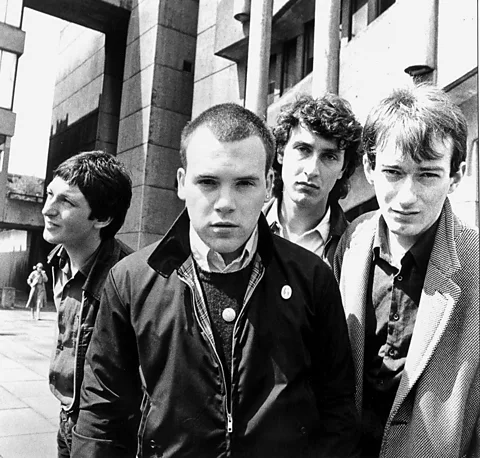 Adrian Boot
Adrian BootSpeaking over video call, he holds up a council pamphlet handed out across the Leeds University campus in the late 1970s, which bleakly advises people what to do in the event of the Soviet Union dropping a one-megaton bomb on the city. It even warns that "at least" 100,000 locals will likely perish. As he explains, it was also a time when the notorious serial killer Peter Sutcliffe, dubbed The Yorkshire Ripper, was at large in the region; he was convicted in 1981 of murdering 13 women (including a Leeds University student, Jacqueline Hill) and attempting to kill seven more. "We had female student friends who literally carried iron bars in their handbags for protection," King says. "All of this tension was being absorbed into our sound. Entertainment! is a record about young people smiling and dancing in the face of disaster."
Referring to the lyrics, "The poor still weak / the rich still rule", from one of Entertainment!'s funkier, more disco-indebted tracks, Not Great Men, where his own drumming replicates the thrust of marching feet at a political rally, bandmate Burnham adds: "The real difference for me, Andy, and Jon, was transitioning from being schoolboys in Kent to suddenly living in the north [of England]. That was a radical shift socially. It really felt like the north had been left behind. Musically, you felt this responsibility to speak up for the working classes."
Gang of Four's ethos can be traced back to the beginnings of King and Gill's friendship, as students at Sevenoaks School, bonding over a shared love of Jimi Hendrix and Bob Dylan. Their relationship only strengthened at university in Leeds and in the autumn of 1976, these two British Fine Art students briefly travelled to New York City on a grant, where they spent most of their time getting drunk and hanging out at Manhattan's CBGB, the iconic live venue and punk mecca. When they finally returned to England, they quickly recruited fellow student Burnham for what King describes as, initially at least, sounding like a "Dr Feelgood tribute act" – referring to the celebrated British rhythm and blues band who were popular in the mid-1970s.
However, these artistic leanings developed into something more novel with the introduction of bassist Dave Allen, who introduced a "jazz and funk sensibility" to proceedings. "We all loved [US funk group] The Meters and the swinging, swaggering songs like Cissy Strut, as well as reggae artists like Bob Marley, who we actually saw perform at the 2,000-capacity Leeds University refectory," says King. "But It was important there was a bit of space in our songs, so we could really build out the tension."
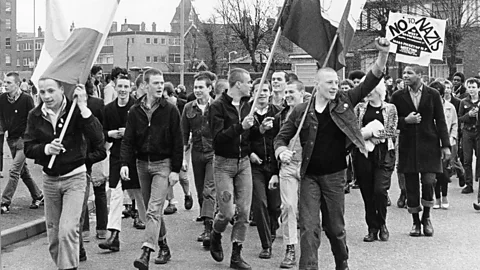 Getty Images
Getty ImagesBurnham interjects: "I was greatly inspired by James Brown's band and [Jamaican drummer] Winston Grennan in my playing. Gang of Four became this beautiful fusion of funk, reggae, rock, disco, punk and dub. But we never wanted to sound like white guys simply imitating [a black sound]. We were trying to create something new."
Even the band's name was political: it referred to the infamous Maoist political faction, composed of four Chinese Communist Party officials, who were later charged with treason. Gang of Four were far from card-carrying Communists, though. The name was intended more as an act of subversive provocation, reflecting how the band all felt like outsiders because of their political beliefs. According to music journalist Simon Reynolds, writing in his book Rip It Up and Start Again, the name was simply reflective of "the left-wing culture of the 1970s, which was defined by student militancy."
King admits a lot of the song writing carried an "alternative Marxist kind of view. I was reading The Action-Image of Society: On Cultural Politicization by Alfred Willener, and it's all about how workers were being made into commodities.
"British people were starting to feel like objects, traded by the capitalists in charge. You can hear this feeling in my lyrics, like on Return The Gift: 'It's on the market, you're on the price list!' The country was just a disaster in the late 1970s. I wanted every lyric to be simple and not far away from the headlines in a tabloid newspaper. They needed to be chantable. Its all a spin on propaganda."
Why their music made such an impression
The resulting music made an immediate impact, with Gang of Four earning a coveted cover on British weekly music magazine NME in January 1979, despite not being signed to a major label and only having a handful of singles – although this quickly changed, when an impressed EMI snapped them up and released their debut album in September. It's fair to say the mischievous attitude of Natural's Not In It, and its storytelling about how consumerism will give you a permanent headache, and the visceral, lust-driven lyrics of Damaged Goods ("Your kiss so sweet/ Your sweat so sour"), sent shockwaves across the musical world. On the latter song, Gill's swaggering yet minimalist guitar licks are as raw as an exposed nerve ending.
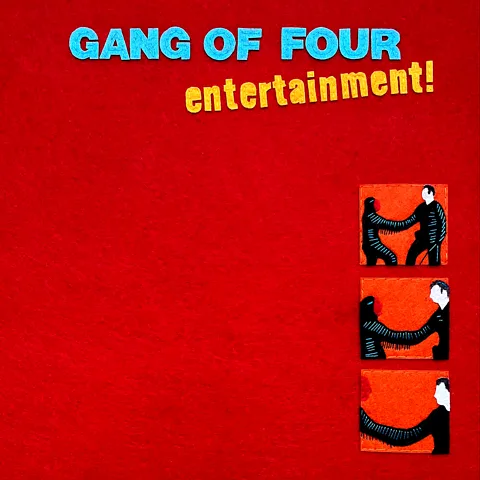 EMI Records
EMI RecordsIn a review of Entertainment!, Rolling Stone"s David Fricke wrote that it was "the best debut album by a British band – punk or otherwise – since the original English release of The Clash in 1977". For Gill's widow, journalist and co-founder of the UK Women's Equality Party, Catherine Mayer – Gill himself passed away in 2020 – Gang of Four rejuvenated the spirits of young people in the late 1970s.
"I use that word: storytelling," she explains. "Gang of Four were utterly radical and uncompromising with their stories. They made us all feel like we could change the future. As hard-edged as Entertainment! is, and as rooted as it is in the dysfunctional, it has these incredibly energising riffs. You hear it and feel like you can 100% go outside and make the world a better place. It's campaigning music, for sure."
Mayer argues that Gill's murky guitar playing is central to Entertainment!'s enduring brilliance – she says he played like someone who "hated the extended, pretentious solos of prog-rock guitarists". Gill's sound is a lesson in deliberate restraint. He plays in small, controlled bursts of rage and just when you expect him to break out into a solo, he withdraws back into himself and holds back. "I used to tease him and call him 'Mr Angular', as all the reviews noted how angular his guitar playing was," she laughs.
More like this:
• Why Oasis defined the spirit of the 90s
"He just created this feral noise that was completely his own," Mayer adds "Take away the guitar and I don't believe it is Gang of Four anymore. The DNA of Andy's guitar is everywhere today! The reason Andy went on to produce for The Red Hot Chilli Peppers, The Futureheads, Michael Hutchence, and The Stranglers, well, that was because they all wanted that Gang of Four Entertainment! sound."
On their protest song The Ground Below, rap duo Run The Jewels (El-P and Killer Mike) sampled Gill's guitar playing from Entertainment's highlight track, Ether. Meanwhile, Frank Ocean sampled another one of its songs, Love Like Anthrax, on the R&B rule-breaker's deep-cut Futura Free back in 2016. One of the things that perhaps helped introduce Gang of Four's music to new generations of artists was Natural's Not In It appearing prominently in director Sofia Coppolla's 2006 film, Marie Antoinette, where this song's blunt lyrics about even love being "purchasable" aligned so perfectly with the movie's depiction of unabashed materialism.
When I ask King why so many contemporary artists still seem to be so inspired by Entertainment!, he speculates that it's to do with socio-political parallels. "In 2024, young people have got the bad end of the stick in every conceivable way. The older generation are creaming it, generally, whether that's owning the best property or having the best pensions. Today young people feel like they're being held back. Entertainment! speaks to those frustrations. It's about that cursed transaction we all make, when we think we're going to get something for nothing, but don't, and then we're trapped in this conundrum. There's so many parallels between 1979 and 2024."
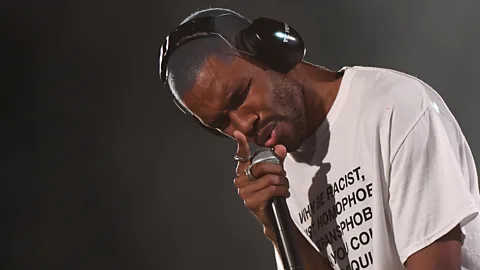 Getty Images
Getty ImagesTo paraphrase At Home He's a Tourist, some would argue that being a young person today, as back then, can feel like taking two steps forwards and then instantly regressing six steps backwards. "Exactly that!" Burnham agrees. "But despite all the pressures, this music is still about seizing the day. It's galvanising."
Where the band went from there
In the years that followed Entertainment!, Gang of Four continued to be an innovative musical presence. They parodied fast-food culture with 1981's Cheeseburger and, released at the height of the Falklands War, the catchy anti-military song I Love A Man in a Uniform was even banned by BBC Radio. Yet, as the 1980s progressed and led on to the 1990s, Gang of Four's sound became more new-wave and shoe-gazey, with noticeably softer textures.
Tensions between Gill and King, often over creative leadership decisions, also meant the band broke up and regrouped in different formations at various points, as they strayed further and further away from Entertainment!'s uniquely raucous sound. In 2011, the pair reunited to record their first proper studio album in 16 years, Content, but the magic, arguably, was lost, and King departed again, leaving Gill as the only original member for two further albums. However, regardless of what you make of Gang of Four's later material, Entertainment! remains the gem of the band's catalogue because of its stubborn refusal to age – and continued impact on today's musicians.
King still enjoys listening to Entertainment! so much because it crystallises a moment where everyone was on the same page and completing each other's sentences. He adds finally: "Andy's great genius was to push things to their very limit. He was a perfectionist. Maybe later on there was tension between us, but when we made Entertainment! we were always smiling. It was a privilege to play that music with him, Hugo and Dave. We were all like brothers."
Mayer's concluding assessment of Entertainment!'s powers is even more precise. She says: "We're living in another age of fear and turbulence. That makes Entertainment! incredibly relevant. It's just utterly radical and uncompromising music." To quote Ether, the song Burnham and King say they most enjoy performing live from Gang of Four's debut as weathered adults today (later this year the pair will embark on a "farewell tour" across North America alongside newer members David Pajo and Gail Greenwood), Entertainment! is still capable of exposing "the dirt behind the daydream".
--
If you liked this story, sign up for The Essential List newsletter – a handpicked selection of features, videos and can't-miss news, delivered to your inbox twice a week.
